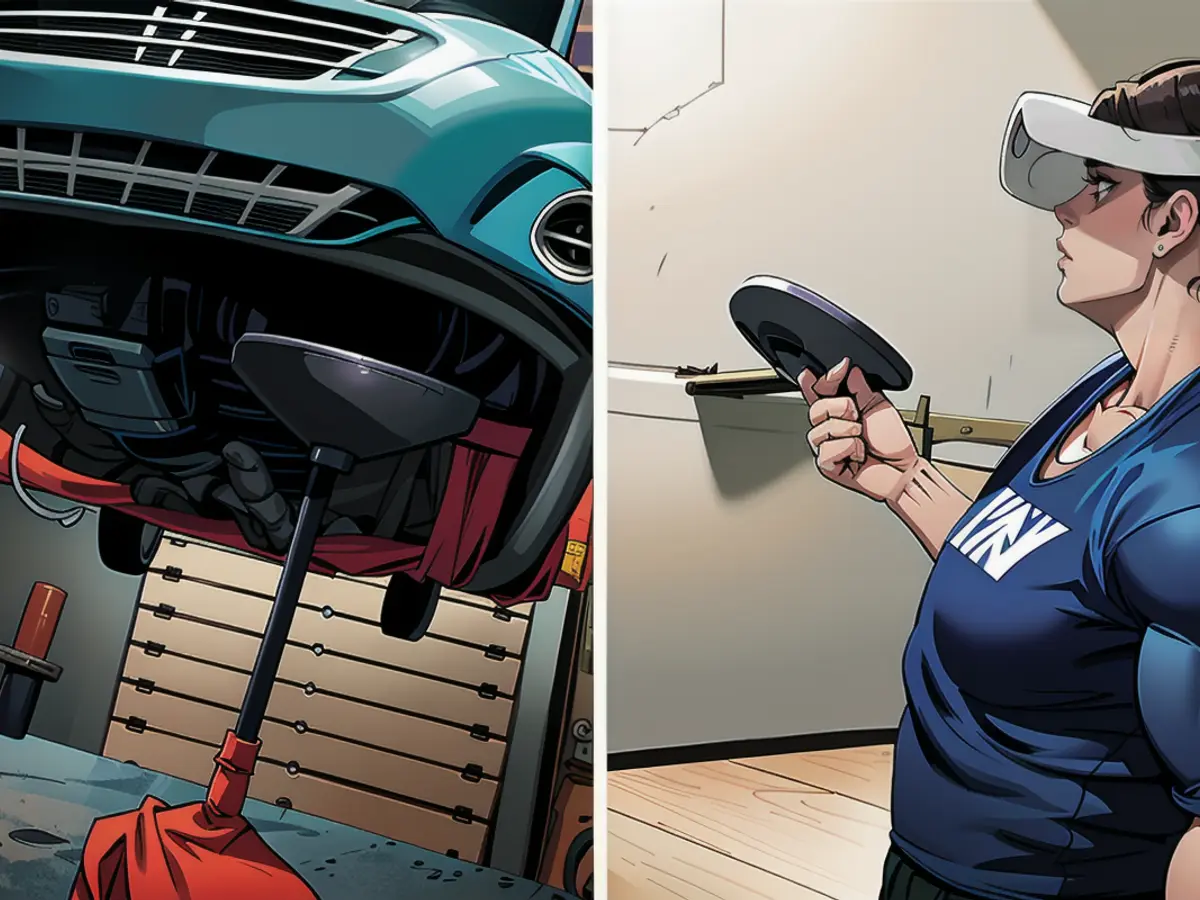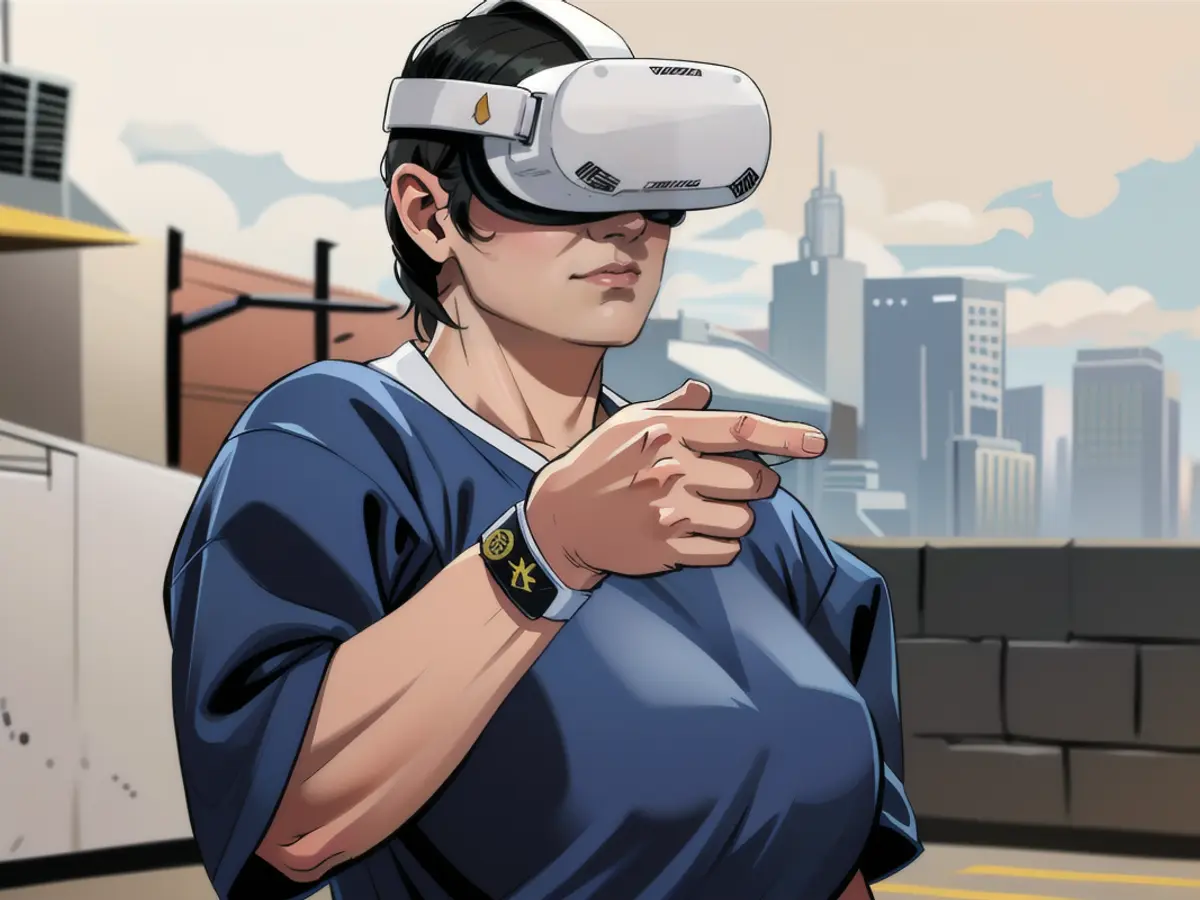Incarcerated individuals are using virtual reality technology to help them adjust to life outside of prison.
But Busch never got a chance to work with a real car during her training. Instead, she learned in a virtual garage using a Meta Quest virtual reality headset.
Busch, 36, is imprisoned at the Maryland Correctional Institution for Women and is part of the initial batch of trainees learning skills in virtual reality that will prepare them to peruse careers as auto technicians when they're released. For Busch, who anticipates being freed in June after spending time in prison since she was 19, this program will give her a significant advantage in re-establishing her life outside of jail.
"It's crucial that we get some form of training," Busch told CNN in a prison interview last month. "I'm excited to come home and use what we've learned here."
Although virtual reality technology has been around for more than a decade, it's often seen as a relatively niche technology, primarily used by gamers. But MCIW, in conjunction with the Baltimore-based non-profit Vehicles for Change, which created the program, is investigating whether VR headsets could make career training more accessible within prisons. The ultimate goal is to lower recidivism rates by ensuring inmates have a clear path to well-paying jobs upon their release.
Across the United States, auto technicians are in high demand; trade groups state that the industry experiences thousands of unoccupied positions annually. And in Maryland, such positions often pay above the state's $15 per hour minimum wage.
"It's not rocket science. It's a matter of giving people a job that leads to a profession, and we can keep people from returning to prison," said Vehicles for Change President Martin Schwartz. "If they can obtain a job that pays $16 to $20 an hour, we can change the path of the recidivism rate."
Vehicles for Change started in 1999 to provide low-income families with reasonably priced vehicles. In 2016, the non-profit established an in-person auto technician training program for previously incarcerated people, where participants would receive paid on-the-job training while fixing cars for Vehicles for Change's clients.
The organization holds relationships with employers such as Napa Auto Parts and AAA, whose representatives sit on its board, to help graduates secure long-term employment after completing the program.
However, during the pandemic, Vehicles for Change could only safely accommodate so many trainees in its garages, prompting Schwartz to seek alternative delivery methods for the training.
He eventually linked up with software company HTX Labs, which had generated virtual reality training programs for the US Air Force and later devised the auto mechanic program for Vehicles for Change.

In addition to MCIW, the non-profit is also testing the VR auto technician training program in correctional facilities in Texas and Virginia.
For leaders in Maryland's correctional department, the VR program provided a way to quickly and easily boost job training in the in-demand auto mechanic field. The corrections department works "very closely with (the state's) Department of Labor to determine what the industry needs are and where the vacancies are," according to Carolyn Scruggs, Maryland's public safety and corrections secretary.
Several of the state's other prisons have hands-on mechanic training programs. But establishing a new garage entails finding the space and acquiring costly equipment — processes further complicated by the stringent security measures required in prisons. Although VR headsets cost around $500 each, they're still a more affordable option than providing conventional hands-on training programs.
"Bringing in VR, it eliminates all the needed space and funding we'd require to build an entire classroom," said Danielle Cox, the Maryland Department of Public Safety and Correctional Services' education director, who oversees the correctional department's 26 job training programs.
"Additionally, it gets them something within a few weeks that would take longer if they were doing hands-on in the classroom," Cox continued. "So we can have some women … leave this place and get a job as soon as they're discharged."
Now in its third batch, the program at MCIW has graduated 15 women since it started a year ago.
Virtual auto mechanic training
Vehicles for Change created the auto technician training program in 2016, where participants received paid training while fixing cars for the organization's clients. The non-profit has connections with employers like Napa Auto Parts and AAA, representatives of which participate in its board, to help graduates find full-time work.
However, since the onset of the Covid-19 pandemic, the non-profit could only accommodate a limited number of trainees safely in its garages. So Schwartz began exploring other options for delivering the training.

He eventually connected with HTX Labs, the software company that had developed virtual reality training programs for the US Air Force and the auto mechanic training program for Vehicles for Change.
In addition to MCIW, the non-profit is also exploring the use of VR for auto technician training in correctional facilities in Texas and Virginia.
Maryland's corrections department considered the VR program an excellent way to expand job training for the in-demand auto mechanic field quickly and conveniently. The department collaborates "very closely with (the state's) Department of Labor to determine what the industry needs are, where the vacancies are," stated Carolyn Scruggs, Maryland's secretary of public safety and correctional services.
Apart from MCIW, several of Maryland's other prisons provide hands-on mechanic training programs. But setting up a new garage necessitates finding the space and securing expensive equipment — processes further complicated by the security protocols in prisons. Although the VR headsets cost around $500 each, they're more affordable than traditional, hands-on training programs.
"With VR, it bypasses the need for space or funding to build an entire classroom," said Danielle Cox, the Maryland Department of Public Safety and Correctional Services' education director, who directs the correctional department's 26 job training programs.
"It also makes it possible for women to have a job right away when they're released," Cox added.
Since its inception last year, the program at MCIW has ushered 15 women through the program.
Can virtual reality really teach you how to repair a car without ever touching a real one? Carpenter says she's completely confident in her abilities. And Schwartz agrees that VR training has great potential. He believes that as employers need more auto workers, they will gladly teach those who have gained skills in the digital world how to apply them safely in a real garage.
"Virtual reality is definitely going to be the way we train the skill trades in five years across the board," he said. "This technology will undoubtedly make a significant impact on prison training, but it will also transform the lives of less fortunate populations in our country who can't afford a community college degree or a trade school. It won't just fill the gap for trades, but it will also help alleviate poverty in this country by utilizing VR"


Read also:
- Telefónica targets market launch for hologram telephony
- vzbv: Internet companies continue to cheat despite ban
- Telefónica targets market launch for hologram telephony in 2026
- AI and climate in schools: how to keep lessons up to date
This virtual reality training program is revolutionizing the way incarcerated individuals prepare for life outside of prison, particularly in the field of auto mechanics. Busch, a participant in the program at the Maryland Correctional Institution for Women, learned her skills in a virtual garage using a Meta Quest headset.
As technology advances, businesses in various industries are beginning to explore the potential of virtual reality for career training. For instance, Vehicles for Change, a non-profit organization, is investigating whether VR headsets can make career training more accessible and lower recidivism rates by ensuring inmates have well-paying jobs upon release.
Source:








